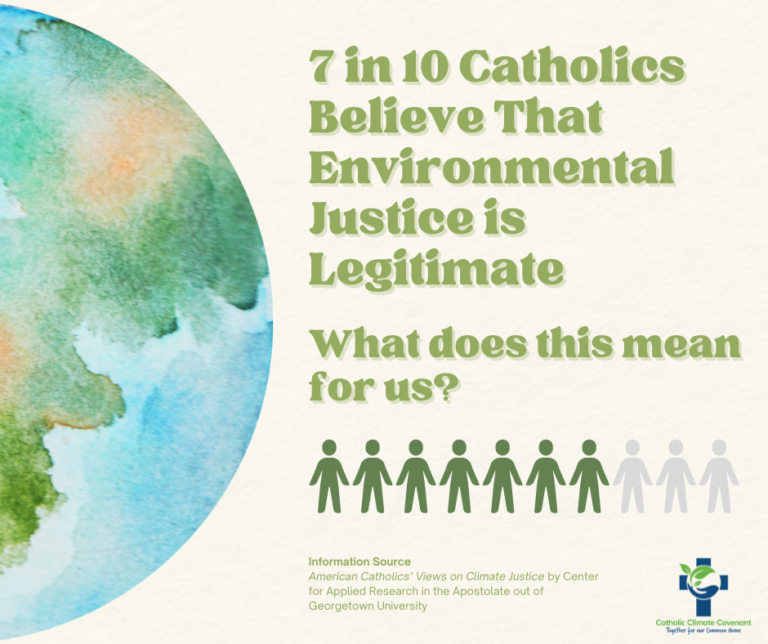I spent the first week of this year in Cuchara, Colorado, a small mountain town near the Spanish Peaks. As I hiked and skied around the literally breathtaking landscape (my Nebraska lungs just weren’t ready for the altitude!), I reflected on the policy actions taken last year in our nation and our Church to care for creation.
Last year was a monumental year for climate action. The Inflation Reduction Act marked the single largest investment in climate solutions in U.S. history, putting nearly $370 billion toward greenhouse gas reduction, environmental justice, improving water quality, and making it more affordable for everyone (including families and parishes) to invest in clean energy solutions like solar panels or electric cars.
And U.S. Catholics were a part of it.
Last year, Catholic Climate Covenant and 11 national faith partners launched the Encounter for Our Common Home campaign for climate solutions, an advocacy effort to move the Church and world ahead in the fight against climate change. More than 1,000 U.S. Catholics have joined the community so far, and are building relationships with legislators, contacting Catholics about “voting for God’s creation,” and engaging their parish and diocesan leadership about climate action within the Church.
Our Encounter campaign reflects a deeper reality in the U.S. Church being felt more now than ever: Catholics are mobilizing on behalf of our common home and common future, and Catholic advocacy for greater climate action is growing. As detailed in a Catholic Climate Covenant webinar on January 10, several federal and state policies this year will prove critical for climate stability. Watch the recording to hear speakers Lindsey Fielder Cook and Fr. Eduardo Agosta Scarel share just how important it is for Catholics to give world leaders a “moral call” on climate change at places like COP28.
There is a discernible shift occurring in the U.S. Catholic Church on climate change. Though prophetic leadership on environmental justice and greater clean energy equity persists, three particular current efforts move us to hopes and plans for implementation of these climate-protecting policies.
- First, the Vatican-led Laudato Si’ Action Platform (LSAP) gives all Catholics and Catholic organizations an opportunity to examine their ecological impact and make necessary changes out of the moral obligation to care for creation through integral ecology. New Platform Director John Mundell spoke at the Covenant’s January 25 webinar, aptly titled, “The Future of Catholic Climate Advocacy: Implementation Done Justly.” He shared that 15 of the 198 U.S. Catholic (arch)dioceses have signed up for the Platform so far, but there is a renewed effort to gather Catholic leadership around the LSAP this year.
- Second, a few dioceses have already agreed to take their LSAP commitments to the next level. Working with Catholic Climate Covenant and Verdis Group, an environmental consulting firm based in Omaha, NE, the Diocese of Davenport and Diocese of San Diego have begun “Net Zero Pathways” to measure their current diocesan greenhouse gas emissions, formulate a plan for reaching net zero emissions by 2050, and find ways to implement their plans on diocese-owned buildings and property. Deacon Kent Ferris, OFS, and Dr. Christina Bagaglio Slentz, PhD, shared their dioceses’ vision for a clean-energy Church in 2023. Much excitement lies ahead, and perhaps the Vatican’s own commitment to reach net zero emissions by 2050 can inspire other U.S. dioceses to do the same.
- Third and finally, young Catholics are calling on leaders to act commensurate with the scale of the climate crisis, the effects of which disproportionally affect our generation. Catholic Climate Covenant is helping empower young voices across the country. For the second straight year, high school students in the Archdiocese of Chicago are hosting a Youth Climate Summit for their peers, connecting climate science to their Catholic faith. The Covenant’s own Emily Burke activates others on social media and continues to call on leaders to “unmute the voice of creation” in the Church. Finally, Catholic young adults now have a year-long fellowship opportunity to receive education and engage Church leaders on climate change and concrete mitigation actions. Expect this Common Home Corps to make great change. Apply or nominate someone for CHC by February 28!
On a global, national, and diocesan level, U.S. Catholics are mobilizing on climate change. People of all ages are coming together to tackle this ecological crisis together, both within and outside the Church. This is where the Church is headed in 2023 – to greater synchronicity between climate action and true faith, to a renewed sense of our place in nature alongside our Eucharistic adoration, and to a more authentic community of love and active participation.
Much work remains for us in this journey but hope springs eternal. The Inflation Reduction Act’s allowance for parishes to receive clean energy tax credits, when accurately explained to Church leaders, can transform the victories of 2022 into a year of groundbreaking work for our Common Home in 2023.
As you discern your place in this movement, we invite you to join the Encounter campaign, contact Catholic Climate Covenant and Catholic Energies staff to discuss net zero and solar projects in your parish and diocese, and continue to pray for deeper ecological conversion in our Church and world.


